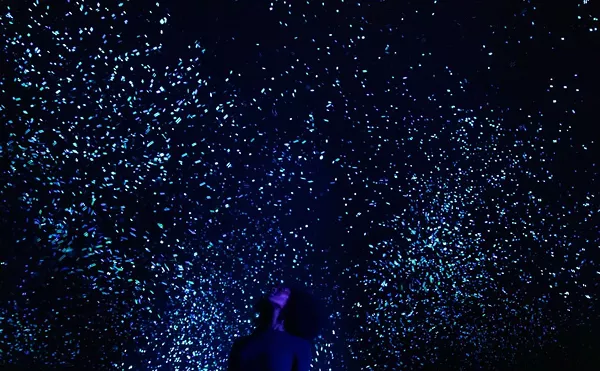Zeal's innovations start with high-contrast polarized lenses: They're in all of the company's goggles and sunglasses and they make a big difference, especially in the flat-light conditions you're likely to get at some point in the day while riding at any Colorado resort. I tried Zeal's Link Goggles with SPX lenses ($100), the more expensive Eclipse Goggles with SPPX photochromatic UV-activated lenses ($200), and the top-of-the-line Transcend GPS SPPX ($499).
I'll start with the Transcend GPS since it's been getting a lot of industry buzz and features a lot of fun stuff you don't realistically need. Zeal partnered with Recon Instruments on the technology, which includes a speedometer, stopwatch, chronometer, altimeter, vertical odometer, thermometer and GPS tracker. It synchs via USB to a computer or smartphone for Google Maps overlays and nerding out on your day's stats, all visible in real-time via a LCD display mounted inside the goggle just below your field of vision on the right eye. On this front I've actually out-nerded Zeal and Recon: The display is difficult to see while wearing the prescription inserts I need in order to see the outside world worth a damn. Still, I had a few hours of good fun bombing blindly down hills at Winter Park to see how fast I could get going and managed not to kill myself or anybody else. If you have decent vision and a couple hundred bucks to blow and you're the type who wants to analyze a bunch of data after a day on the slopes, then this is the goggle for you. I'll mostly gloss over the entry-level option and go for the middle road: After falling for the photochromatic SPPX lenses in both the Transcend GPS and the Eclipse (right), I couldn't get excited about the Link SPX goggles I tried. Why? It turns out that UV-activated lenses are a must-have on Colorado slopes (who knew?), where light conditions can change radically over the course of a day or even over the course of a single run. The SPPX lenses go from light yellow tint to dark rose/amber, suitable for anything from bright sunlight to dumping snow to last-run-of-the-day flat light, and they're worth the $100 splurge for this month's Spring conditions. If (like me) you need the Rx inserts, get them at Sports Optical in the Highlands, 4337 Tennyson Street: They turned my prescription lenses around in about 30 minutes. Speaking of nerding out, I've also been testing Zeal's Reliant Solar-Powered Backpack ($199), which charges any USB or mini-USB device. Since I cover snowboarding events professionally, I've been using it to juice up my Samsung Epic smartphone and my iPod, which I use as a voice recorder when I'm doing interviews.The solar panel failed me entirely at the Burton U.S. Open at Stratton Mountain, VT, where it rained ice for days and I never saw the sun, but has been working like a charm back home in Colorado. The pack doesn't have a lot of carrying capacity -- it won't get you through an overnight trip unless you're an extreme fastpacker -- but does have a couple of cool features in addition to the solar panel: A lightweight "wind tunnel" frame kept the pack off my sweaty back, accessory pockets held my techie gear, and a pack-sized poncho pulls out of a hidden pouch to cover the entire pack, handy when I was standing in that icy rain at the edge of the halfpipe with my laptop and other reporters' gear tucked inside. The Reliant doesn't come with a hydration bladder but does feature a bladder pouch and a slit for the straw tube, side pouches are handy for stashing snacks and extra layers, and I've been using the ice axe loop to hang my helmet when I'm not riding.
It's not exactly going off the grid, but it certainly is handy if you need to stay connected while you're nowhere near a wall outlet or if you're trying to leave a lighter energy footprint.
For more in this series check out my feature on the top 2011/2012 gear from Colorado companies at the SIA Snow Show and the Colorado Head-to-Toe archives.












